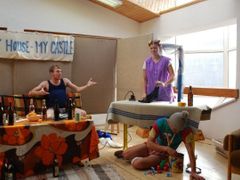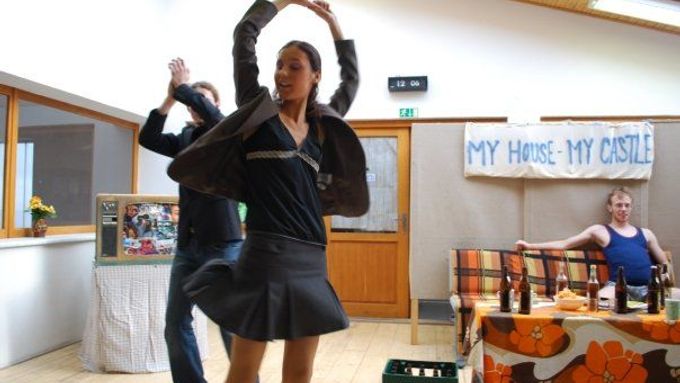
More at Prague Wanderer
There are beer bottles all over the floor, toys broken into pieces, and pink panties on fire fly in the air only to be put out by… beer.
"My House-My Castle" reads a banner that decorates the living room. It's my third hour in this small Czech town, and I'm already witnessing the most disrespectful and racist family known to man.
The beer-bellied Czech father scolds his kids by saying "Get the fuck out of here!" He barely gives his Ukrainian worker enough to pay public transportation. And his wife, just like him, disapproves of all the decisions her children are making - proposing to a gypsy, helping out a poor, beat-up Vietnamese boy, and discovering homosexuality.
It's so hard for me to speak out against the horrid racism, but it's so easy for me to wail in laughter along with the rest of the audience. This is the best anti-racist play I've ever seen.
Czech melting pot
But Czech melting pot, put on by a group of uber-talented high school students is actually a reality for an unreasonable number of residents in Hlinsko according to the students' English teacher, Lada Kusa.
Kusa said the racist taunts by the parents in the play — you, Ukrainians, are here to steal the jobs from Czechs — were not exaggerated.
"The conversations are normal [in Hlinsko]," said Kusa, the author of the play and a longtime resident of Hlinsko, a town of 10,000 about 100 miles east of Prague. "No one thinks it's wrong," says Kusa, who claims she's constantly hearing these racist phrases in everyday conversations.
The parents' disgust with their son's choice of "pure love" with a gypsy is felt all over the Czech Republic, Kusa says. There are only 10 gypsies in Hlinsko, she speculates, and her students do not have contact with them. But in the Czech lands, suspicion of gypsies is endemic, surveys show.
The Vietnamese, portrayed in the play by a male student painted yellow, are more visible in Hlinsko, but only in the shops. "Where do they go after they close the shops? I don't know… I don't know," she wondered.
Easy to relate
For the play's American audience, visiting students from New York University in Prague, the xenophobia paraded on stage wasn't that new. Our nation has a long experience with government sanctioned racism and discrimination - slavery, segregation of Blacks and other minorities, and exploitation of minority workers such as Mexicans - so it was easy to relate to the Hlinsko performance.
But today, we Americans feel so diverse in our multiculturalism, so full of reflection from all our mistakes, that we have moved on to more subtle forms of discrimination than saying out loud that we hate this group or that group. In the United States, no one wants to be called a bigot.
Kusa, 34, believes that the Czech Republic is only just beginning to pry the lid open on such issues, which is why she wrote the play. So people will start talking.
Understanding homogeneous society
When we asked the Czech students if they deal with these racist commentaries at home, they claim they have never experienced it.
Kusa doesn't believe them. "Ninety-five percent of the people I have met here say things like that," she said. "I'm sure they hear it at home."

Her script incorporates actual phrases she's heard around Hlinsko. "You gypsies have been whoring around since the middle-ages," or "Vietnamese, they are everywhere in town. I hate them!" are prime examples.
Kusa explained that Czech xenophobia cannot be understood without reflecting on the homogeneous society that fell apart with the end of the Communist regime. Suddenly a country with very few foreigners that was largely closed to the outside world became exposed to immigration. In the prism of capitalism, new arrivals were viewed as work competition.
"Older generations never had a chance to travel much and they stayed at home," Kusa said, "so they developed a fear of foreigners. Younger generations have nothing to do with communism so they're more open."
A study released in December by the non-governmental organization People In Need showed that Czech teachers don't really understand the concept of multicultural education.
Kusa's students performed the play again for the Czech parents, and "it was a disaster," she said. "It was a cold response. I think it might be 50 percent due to the fact that some parents did not understand the content" because it was in English. She plans to translate the play into Czech.
Kusa says she can feel the discomfort among her fellow Hlinsko residents when the topic of racism is broached.
"I found it outrageous," says Kusa. "I have felt no one is discussing this issue at home, only in my English class." Her students believe the more educated population in Hlinsko, those with university degrees, are less likely to hold racist views. However, there are older people who are very well-educated and still discriminate against the minorities, according to Kusa.
But she admits that intolerance may be on the wane.
Asked whether young people will help eradicate xenophobia , she says that it is an upward battle, but one that can and is being won. "The stable revolution is coming now," she said.
This story was originally published by the Prague Wanderer, a web-zine run by New York University students in Prague, Czech Republic.
Carolina Sanchez is a third-year student at New York University studying journalism and sociology. She is from The Colony, Texas.
